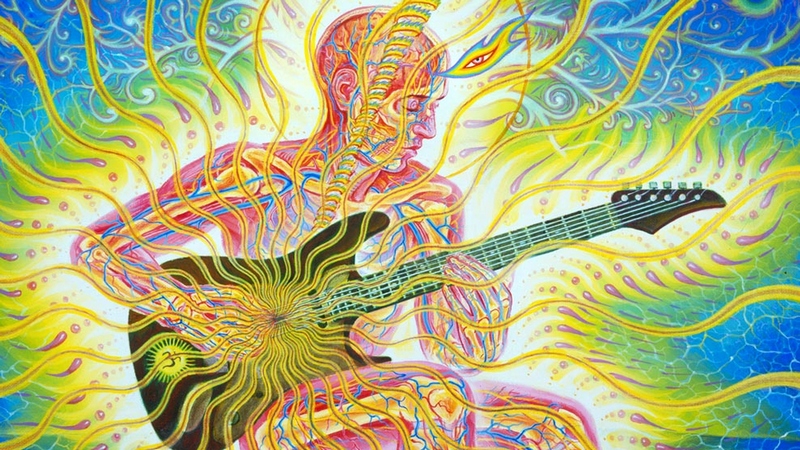Aside from its hallucinogenic properties, LSD is known to have noticeable effects on emotion. This is one of the reasons why psychedelics were used in psychotherapy in the 1950s and 60s, hypothesizing that they facilitate emotional release and insight [1][2]. Similarly, music can evoke emotion and was also a component in psychedelic-assisted psychotherapy, for aiding emotional arousal and release, and in promoting the occurrence of peak or spiritual-type experiences [3][4]. Working at Imperial College, London, neuroscientist and OPEN board member Mendel Kaelen and colleagues conducted a study [5] aiming to explore the significance of music in psychedelic-assisted psychotherapy. Using a placebo-controlled setup, the study sought to test the hypothesis that the emotional response to music is enhanced on LSD. The research team also investigated the role of music in occasioning peak or spiritual-type experiences.
Ten participants attended two study days. During one such day, they received a placebo (10ml saline), while on the other day they were given between 40 and 80 μg of LSD, with roughly a week in between. The design was single-blind, which means participants were blind to which condition they were in, but researchers were not. Participants listened to a playlist of five different (mostly neo-classical and ambient) instrumental tracks on each of the two study days, with the order of the playlist counterbalanced across participants. In order to assess the emotional response to the music, participants were asked how emotionally affected they were by the music, which served as the primary outcome. Furthermore, the Geneva Emotional Music Scale (GEMS-9) was used to investigate the specific factors of the participants’ emotional experiences, consisting of nine subcategories of emotion (wonder, transcendence, power, tenderness, nostalgia, peacefulness, joyful activation, and tension). The results showed that the mean scores for the emotional response to music were significantly higher for the LSD condition than for the placebo. Additionally, all nine factors on the GEMS-9 scored higher in the LSD condition than in the placebo, with significant increases for the items “wonder”, “transcendence”, “power” and “tenderness”. Correlational analyses showed a significant positive relationship between ratings of intensity of drug effects and emotional arousal to music.
The finding that LSD enhances the emotional response to music supports the popular assumption that music has more significance under the influence of psychedelic drugs. Emotions of transcendence and wonder are traditionally thought of as core constituents of peak and spiritual experiences [6][7]. This led the authors to infer that the combination of LSD and music may increase the likelihood of having spiritual-type or peak experiences. Moreover, these experiences have been shown to correlate with sustained improvements in well-being and life satisfaction [8] and also with increases in the personality trait of openness [9], which supports the view that music is an important element in psychedelic-assisted therapy.
Due to this being a pilot study, it does come with its limitations. Small sample size and musical genre selection mean that results cannot be generalised to a larger population. Also, participants could have guessed the purpose of the study, meaning the results could reflect their own or the researchers’ expectations. Additionally, results could be attributed to the effect of LSD alone, rather than the specific effect of music in combination with the drug.
When asked about the implications of his study for future research, Mr. Kaelen told us these are just humble first steps in helping build an evidence-based approach to psychedelic therapy. “It’s important to start a discussion on the role of music and the importance of the setting in general within psychedelic therapy,” Kaelen said. “Due to the study’s limitations, future studies have to come up with different designs and more detailed research questions.” Kaelen also mentioned research already underway at Imperial College, including brain imaging studies with FMRI and MEG, which aim to investigate which brain mechanisms are involved. He also emphasised the importance of translating elements into clinical work. “A clinical trial, now in progress at Imperial, uses psilocybin for treatment-resistant depression. Part of this study looks at the role of music, which will hopefully further our understanding of how music and psychedelic therapy work together.”
[1] Busch AK, Johnson WC (1950) L.S.D. 25 as an aid in psychotherapy; preliminary report of a new drug. Diseases of the nervous system 11: 241-243
[2] Leuner HC (1983) Psycholytic therapy: Hallucinogenics as an aid in psychodynamically oriented psychotherapy In Psychedelic Reflections, ed. Grinspoon L & Bakalar JB, pp. 177-192: Human Science Press
[3] Bonny HL, Pahnke WN (1972) The use of music in psychedelic (LSD) psychotherapy. Journal of music therapy: 64-87
[4] Grof S (1980) LSD Psychotherapy. Hunter House Publishers, US.
[5] Kaelen et al. (2015) LSD enhances the emotional response to music . Psychopharmacology [Abstract]
[6] Maslow AH (1993) The Farther Reaches of Human Nature. Arkana
[7] Richards WA (2009) The rebirth of research with entheogens: lessons from the past and hypotheses for the future. The Journal of Transpersonal Psychology Vol. 41: 139-150
[8] Griffiths RR, Richards W, Johnson MW, McCann U, Jesse R (2008) Mystical-type experiences occasioned by psilocybin mediate the attribution of personal meaning and spiritual significance 14 months later. Journal of psychopharmacology 22: 621-632
[9] MacLean KA, Johnson MW, Griffiths RR (2011) Mystical experiences occasioned by the hallucinogen psilocybin lead to increases in the personality domain of openness. Journal of psychopharmacology 25: 1453-1461













